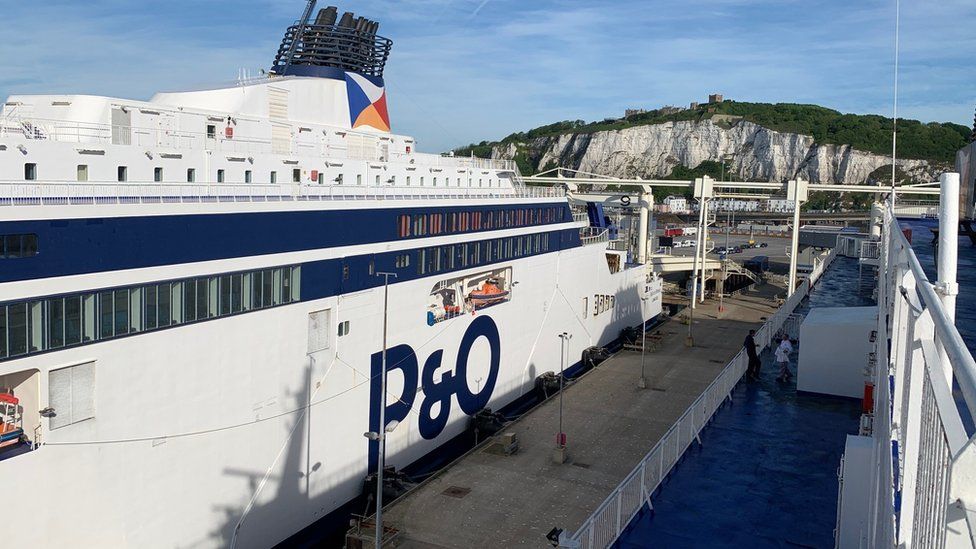The boss of P&O Ferries has said he is “incredibly sorry” for the impact felt by hundreds of staff who were recently sacked by the company without notice.
But Peter Hebblethwaite insisted the decision was “the route we only deemed possible”.
P&O Ferries sacked almost 800 seafarers in March and replaced them with foreign agency workers paid less than the minimum wage.
The move sparked outrage and led to calls for Mr Hebblethwaite to resign.
At the time, P&O Ferries said the decision would ensure the future of the business.
When asked how he would feel if he was sacked in the same way, Mr Hebblethwaite told the BBC it is “not pleasant being made redundant”.
“I’m incredibly sorry, on the decision we took had a material impact on a number of our ex-employees. And I do regret that,” he added.
However, the P&O Ferries boss insisted the move was “the route we only deemed possible for us to take”, and part of “a difficult decision and repositioning for a better future”.
When P&O Ferries previously made redundancies due to economic pressures caused by the coronavirus pandemic, the business had consulted unions before, but decided not to when it sacked hundreds more 10 weeks ago.
Mr Hebblethwaite denied the decision to sack staff meant the firm was taking part in a race to the bottom on pay and standards, saying P&O needed to modernise and become competitive.
He claimed it had issued the biggest redundancy package in maritime history.
When pushed on how he justified ignoring the legal requirement to consult staff in advance of redundancy, and on the details of how and when the decision was made on how staff were to be sacked, the P&O Ferries boss declined to comment due to an ongoing investigation by the insolvency service.
He also refused to comment on whether the flag status of P&O Ferries’ ships meant the company could get round UK workers’ rights.
It was put to Mr Hebblethwaite that the decision had resulted in a huge reputational hit, but he said that was not what the P&O was experiencing, adding the firm had “seen really encouraging bookings coming through”.
When challenged on pay levels, and the fact that seafarers on Dover to Calais route were being paid well below the UK National Minimum Wage, he said the firm’s wages were consistent with international standards, adding the crewing model was consistent with 80% of global shipping.
However, he said if the law was changed in the UK, as per the government’s ambitions to pay seafarers working in and out of British ports the minimum wage, the company “will absolutely do what we are required to do by law”.
The chief executive also said the firm was “trying very hard” to return items to former workers, but admitted some possessions were still missing after being left on the ships when sacked workers were escorted off.
This was the first time Peter Hebblethwaite has taken questions from the media, on camera, since the shock dismissal of 786 seafarers.
We learned a bit about his background. He trained as an accountant and worked in retail and hospitality operations before joining P&O Ferries in 2019.
Mr Hebblethwaite on the one hand expressed regret over the impact on sacked workers, but on the other hand was bullish about the company’s future.
He confirmed some sacked workers still haven’t had personal belongings returned but insisted this was a small number and efforts continued to locate missing items – although he couldn’t guarantee they would all be found.
He described plans to give the business a “glorious” future, and believes customers will return. The company expects to take delivery of new high-tech ships next year.
P&O clearly wishes to move on. But the events of 17 March did not only affect workers who lost their jobs, and prompt outrage from politicians and unions.
They also clearly caused reputational damage to the business. Real anger still exists among sacked workers about how they have been treated.
And it seems unlikely the difficult questions will disappear, even as P&O looks to the future.
‘Difficult couple of months’
Separately, Mr Hebblethwaite apologised to customers about the impact of ferries being out of service, particularly on the busy Dover-Calais crossing.
P&O Ferries services were suspended after the mass sackings and several of the company’s vessels failed safety inspections before being cleared to re-enter service.
The reduced ferry capacity was a contributing factor in particularly long lorry queues building up on the way to Dover before Easter.
Mr Hebblethwaite spoke to the BBC for an exclusive interview aboard the Pride of Kent, which was passed fit to sail at the fourth attempt.
Admitting it took “longer than they would have liked” to get its ships back into service, the chief executive said it had been “a difficult couple of months”.
“I want to say sorry to our customers for the delay in us getting back into service, but it was important that safety was right. We are being held to a high standard,” he said.
To view the original article, click here.




